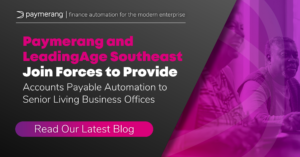Streamlining Healthcare Finance with AP Automation: A CFO’s Guide to Digital Transformation
Financial management is critical to the success of any healthcare organization.
But in uncertain economic times like these, finance takes on an increasingly important role.
The combination of rising interest rates, high inflation, clogged global supply chains, and a challenging labor market have wreaked havoc on the cash flow of many healthcare organizations.
As healthcare organizations try to navigate economic turbulence, they are going to lean hard on their finance departments. Outdated financial technologies won’t be enough to meet these challenges.
Healthcare organizations must transform their finance operations with digital tools such as intelligent data capture, automated workflows, and artificial intelligence with machine learning.
Top priorities of CFOs for healthcare organizations:
The CFOs at healthcare organizations are facing significant financial headwinds.
Here are some of their top priorities:
- Cash flow. Economic turbulence can disrupt a healthcare organization’s cash flow and make it difficult to accurately forecast cash.
- Liquidity management. Staying one step ahead of financial uncertainty requires CFOs to have smart insights into the organization’s cash flow, spending, and costs.
- Revenue cycle management. Effectively managing claims processing, patient billing, payment processing, and collections are crucial when economic times get tough.
- Cost reduction. Every healthcare organization wants to do more with less. But CFOs must strike the right balance between reducing costs and maintaining quality care.
- Risk management. From regulatory compliance to cybersecurity, CFOs must identify and manage risks to protect the organization’s finances.
- Strategic planning. CFOs are expected to develop and implement strategic plans to help the organization seize new growth opportunities and achieve its mission and goals.
Legacy finance systems aren’t enough to help CFOs achieve these priorities.
That’s why more CFOs are transforming their finance operations with digital technologies.
What is finance automation?
Automation enables healthcare organizations to digitize and simplify financial tasks such as budgeting, accounts payable, billing, revenue cycle management, and financial reporting.
Eliminating manual finance tasks such as keying invoice data, shuffling paper and emails, chasing down information, and fixing errors and mistakes reduces overhead, improves accuracy, accelerates financial decision-making, and mitigates the risk of compliance issues and cybersecurity breaches. It also can improve financial transparency, optimize resources, and drive better financial performance.
Importantly, automating manual, repetitive administrative tasks such as processing invoices frees back-office staff to focus more time on activities that can help deliver quality care to patients.
How to transform your finance operations:
The financial operations of a healthcare organization can be complex. Choosing the wrong financial technology can set a healthcare organization back. Here are some strategies that CFOs can use to digitally transform their finance operations to improve efficiency and effectiveness and mitigate risk.
- Assess where things stand. A physician would never prescribe a treatment without first diagnosing the patient. Similarly, it’s critical that CFOs understand the current state for their financial operations before starting an automation project. Thoroughly review existing financial processes to identify potential areas of improvement. Map out every step of critical processes to understand inputs, outputs, handoffs, stakeholders, and decision points. And be on the lookout for redundancies, and other inefficiencies that bog your finance team down.
- Determine your objectives. The finance department of healthcare organizations has lots of moving parts. Work with stakeholders to determine priorities for automation. Getting early automation wins will help drive adoption among frontline staff, test the technology, build the C-Suite’s confidence in your automation efforts, and deliver return on investment (ROI).
- Choose the right technology partner. The best digital technologies streamline financial processes and deliver tremendous cost savings. Look for a technology partner with the features and functionality you need, intuitive and easy to use software, a proven track record in automating financial tasks, services layered on top of their technology, and a roadmap for evolving their technology. Also be sure that prospective solutions that integrate well with your enterprise resource planning (ERP) application and other legacy technologies.
- Prioritize electronic payments. Automated Clearing House (ACH) and card payments significantly reduce the time, cost, and resources required for healthcare organizations to pay suppliers. Look for a solution that uses a single file from an ERP or accounting software package to initiate payments of any type, tracks the status of payments in real-time, and reconciles payments automatically with an organization’s ERP or accounting software.
These strategies will help ensure a healthcare organization achieves the full benefits of automation.
Transform your financial operations:
The finance department can play big role in helping a healthcare organization navigate a turbulent economy. By automating accounts payable and other financial processes with digital technologies, a healthcare organization can improve efficiency, achieve transparency, and mitigate potential risks.
To get started with automation, schedule a demo with Paymerang now.




